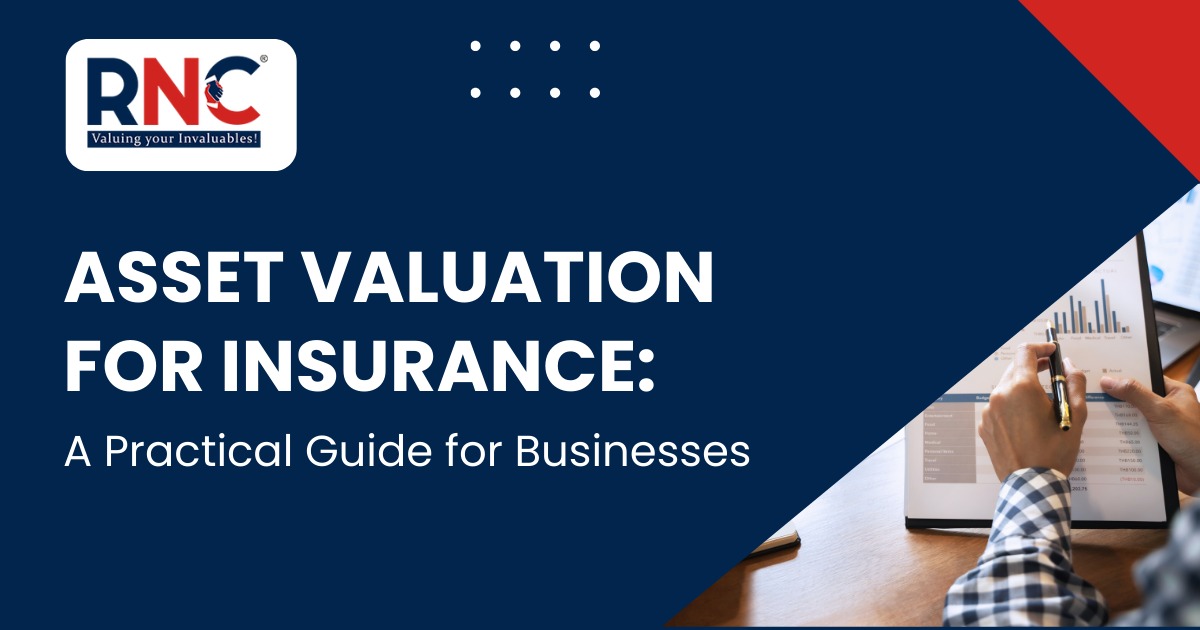
Asset valuation for insurance is one of the most overlooked yet critical areas of risk management. Many companies realize the importance of accurate valuation only after an unfortunate claim or audit dispute.
In 2025, insurers and auditors demand transparency, data-backed reports, and alignment with International Valuation Standards (IVS). Whether you’re insuring plant machinery, factories, or commercial assets, understanding the right valuation methods ensures that your coverage truly reflects replacement cost and risk exposure.
Businesses today face increasing compliance requirements, audit checks, and risk exposures. Accurate insurance valuation not only protects against claim disputes but also ensures financial reporting aligns with regulatory standards.
In this article, RNC Expert explains how asset valuation for insurance works, why it matters, and how it protects businesses from underinsurance, overinsurance, and financial losses.
What Is Asset Valuation for Insurance?
Asset valuation for insurance determines the correct replacement or reinstatement value of physical assets — buildings, machinery, equipment, and inventory — so that insurance coverage equals real value.
Inaccurate valuation can result in:
-
Underinsurance: Loss recoveries fall short of actual repair/replacement costs.
-
Overinsurance: You pay higher premiums for no added benefit.
By conducting periodic professional valuations, companies ensure fair coverage, accurate risk pricing, and compliance with insurer requirements.
Why It Matters in 2025
With increased climate risks, automation, and global supply chain volatility, asset values are changing faster than before.
🔹 Key Benefits of Accurate Insurance Valuation
-
Prevents claim shortfall during loss or damage.
-
Builds trust with insurers and auditors.
-
Ensures compliance with IND-AS 16 and IFRS 13.
-
Helps businesses plan capital expenditure and depreciation better.
“Valuation isn’t just about numbers — it’s about ensuring financial resilience when things go wrong.”
— RNC Insurance Valuation Expert
Common Methods of Asset Valuation for Insurance
| Method | Description | Ideal Use |
|---|---|---|
| Reinstatement Value (RVI) | Current cost to replace the asset with a similar new one | Buildings, machinery, equipment |
| Depreciated Replacement Cost (DRC) | Replacement value minus physical depreciation | Aging industrial assets |
| Market Value Approach | Value based on what buyers will pay today | Resale-based insurance valuations |
| Indemnity Value | Cost of repair or replacement less wear & tear | General insurance for movable assets |
| Book Value Approach | Based on accounting records | For reference, not for coverage purposes |
📊 Learn more about our professional asset valuation process → Insurance Valuation Services
Step-by-Step Process Followed by RNC Valuers
-
Asset Identification: Listing and tagging all insurable items.
-
Data Collection: Age, cost, capacity, condition, and maintenance history.
-
Site Verification: Physical inspection to confirm accuracy.
-
Valuation Method Selection: Based on asset type and purpose.
-
Computation of Value: Using reinstatement or DRC models.
-
Final Report: With photographic evidence and insurer-ready summary.
This structured approach ensures transparency and full regulatory compliance.
Real-World Example
A pharmaceutical manufacturer insured machinery worth ₹15 crore at book value in 2020.
By 2025, replacement cost increased to ₹23 crore — yet the insurance coverage remained unchanged.
When fire damage occurred, the company recovered only 65% of the claim.
Periodic professional valuation could have prevented underinsurance and ensured complete recovery.
AI & Technology in Insurance Valuation (2025)
Artificial Intelligence has transformed asset valuation accuracy:
-
AI models benchmark equipment values against live market databases.
-
Drones & IoT sensors provide real-time condition monitoring.
-
Predictive analytics estimate depreciation and repair costs instantly.
“AI speeds up the process, but human valuers ensure context and compliance.”
— RNC Certified Valuer
FAQs
1. Why is asset valuation important for insurance?
It ensures your insured value matches actual replacement cost, preventing underinsurance or claim rejection.
2. How often should insurance valuation be done?
Every 2–3 years, or sooner if major upgrades or relocations occur.
3. Which valuation method is best for insurance?
For most assets, the Reinstatement Value Method gives the most realistic estimate for replacement.
4. Does insurance valuation affect premium cost?
Yes. Correct valuation helps optimize premiums — avoiding both overpayment and insufficient coverage.
Conclusion
Accurate asset valuation for insurance is not just about numbers — it’s about protecting your business from unexpected risks, ensuring compliance, and maintaining financial stability. Regular and professional valuations help avoid underinsurance, reduce disputes during claims, and provide confidence to stakeholders.
By keeping asset values updated, businesses can strike the right balance between fair premiums and reliable protection, safeguarding both operations and reputation.
Looking for expert asset valuation services? Get in touch with RNC Valuecon LLP today to protect your enterprise through reliable insurance asset assessments.

About the author:
Sahil Narula
Sahil Narula is the Managing Partner at RNC Valuecon LLP and a Registered Valuer with IBBI. He brings over a decade of experience in Valuation Services, Corporate Finance, and Advisory, having led numerous complex assignments under the Insolvency & Bankruptcy Code, 2016, Mergers & Acquisitions, Insurance, and Financial Reporting.
He is a regular speaker at national forums (ASSOCHAM, CII, ICAI, IBBI, Legal Era) and currently serves as Co-Chairman of ASSOCHAM’s National Council on Insolvency & Valuations and a member of CII’s Task Force on Insolvency & Bankruptcy.
🤝Connect with Sahil on LinkedIn.
